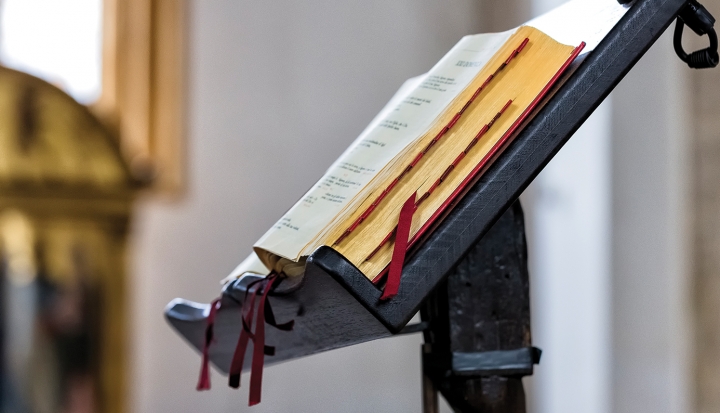My first experience of praying the Liturgy of the Hours—also called the divine office—was hardly love at first sight. I was an 18-year-old college freshman, and my friend Samantha invited me to pray morning prayer with her. Not fully awake, I made my way down to the residence hall lobby and tried to follow Samantha as we moved through Lauds. Although she had arranged various colored ribbons to mark the correct pages in the thick breviary, I kept losing my place as I clumsily flipped from antiphons to psalms to the intercessions.
Moreover, the words we spoke didn’t feel like my own. In central Wisconsin during the winter, it’s still dark at 7 a.m., so the prayers about “greeting the dawn” seemed out of place. The psalmist’s words of searing anger, euphoric joy, and bitter complaint didn’t reflect my own heart. Although I was a bit anxious about a chemistry exam and excited about my weekend plans with friends, my emotional state surely wasn’t reflected in the words we spoke together. How then could this prayer be genuine?
Nearly 20 years after that winter morning in the dormitory lounge, the divine office has become both familiar and beloved. The architecture of the divine office, which once felt confusing and complex, now offers a reassuring frame. In moments when the wind is knocked out of me and I don’t know how to even begin to make sense of what is in my mind or heart, the office carries me. Wherever I am at internally, to recite or chant the divine office is to step into an ancient river of common prayer that began long before me and will continue long after.
The divine office, or the “public prayer of the church,” began when early Christians maintained the Jewish practice of praying the psalms at particular points of the day. As this ancient prayer form evolved through the time of the desert fathers and St. Benedict, readings from the New Testament were woven in. Today each period of the divine office is comprised of several psalms, each bookended with an antiphon (like a refrain) and a doxology (a proclamation of praise to God). This is followed by a canticle—either the Benedictus, the Magnificat, or the Nunc Dimittis—and bookended by another antiphon. Next are intercessory prayers, which are gathered together into the Lord’s Prayer. The prayers of the divine office can be spoken or chanted and can be prayed individually or in a community of any size.
The divine office is central for cloistered monks and nuns, who pray not only in the morning, evening, and night but also at several other periods, including vigils in the middle of the night. Clergy and apostolic men and women religious also pray the divine office, grounding their lives of active ministry in this common prayer. Lauds (morning prayer), vespers (evening prayer), and compline (night prayer) feel like hinges as the day begins and ends. This pattern fits into the weekly rhythm, moving from Sunday to Sunday. All of this fits into the larger sacred choreography of the liturgical year with its movements from Advent to Christmas to Lent to Easter, a wheel of sacred mysteries that turns each year.
Although the divine office is often thought of as a prayer for those in monasteries, lay Catholics have been encouraged to pray it since the Second Vatican Council. I’ve prayed the divine office with large groups in beautiful chapels with incense and music, with another sister over the phone, and alone on airplanes or in bus depots.
And those extremes of emotion expressed in the psalms and canticles that were so off-putting to my 18-year-old self? They seem now to be a refreshingly candid reflection of the human experience. The frank words offering God joyful gratitude or deep despair and quiet hope or vengeful rage seem like a treasure in our Judeo-Christian tradition. There is ample room in these scriptures for the whole messy range of human experience. They are big enough for all the human emotion in our inner worlds and outer world—all the various voices within us and in our world.
If we are truthful, there are parts of us that feel these raw, uncomfortable sentiments, parts that our more respectable adult parts often want to hide or ignore. The strong, candid—sometimes even offensive!—language of the divine office grants permission for those less-polished parts to be offered to God.
The opening lines ask God to “come to my assistance, make haste to help me,” reminding me of my dependence, my lack of control. There is no pretense, no “cleaning it up” before showing up to pray. Each psalm or canticle is punctuated with a doxology, sanctifying whatever plaintive words of prayer came before.
What I didn’t understand when I first prayed the divine office 20 years ago is that, since it is the prayer of the church offered for the world, I don’t have to feel the emotions behind the words. “When the psalms we’re praying don’t match our inner state, well, we’re not praying those prayers for ourselves. There are people somewhere in the world feeling that emotion—we can offer it to God on their behalf,” Dominican brother Carl Joseph Paustian once told me. The divine office, in other words, is not a private “me and Jesus” devotion. Even if I pray it by myself, I pray it as part of the church and never truly alone.
This ancient form of prayer pulls me out of wherever I am internally and connects me with all creation: with those suffering the effects of hurricanes and earthquakes, those who are incarcerated or on death row, those who face poverty and war daily, and the victims and perpetrators of all forms of violence.
Some find the divine office too wordy or find themselves distracted by this prayer style. Episcopal priest and author Lauren Winner’s take on this resonates with my own experience: “My mouth may have been mouthing psalms, but my brain was thinking grocery lists or weekend plans. But if roteness is a danger, it is also the way liturgy works. When you don’t have to think all the time about what words you are going to say next, you are free to fully enter into the act of praying; you are free to participate in the life of God.” Entering into the divine office—or any formal, set spiritual discipline—puts me in a posture of openness to God, even if my heart and mind aren’t always “caught up.”
Last year, during a visit to the Trappist Gethsemani Abbey, where recitation of the divine office is an anchor of monastic life, these words from an abbot’s chapter talk touched me deeply: “The Liturgy of the Hours . . . is an ongoing restructuring of our mind and hearts.” I do sense that daily practice of the divine office is working on me, sometimes consciously, but more often what I sense is on a subterranean level. I don’t know how this works, but on good days I sense that it does, and on bad days I trust that it does, even if I can’t feel it.
The discipline of the divine office reminds me I am an ecclesial person, in union with people around the globe, praying for the life of the world with words used in countless languages over millennia to cry out to God for mercy. It’s a way of loving the world, of offering up to God the “joys and hopes, griefs and anxieties” of all people.
This article also appears in the July 2019 issue of U.S. Catholic (Vol. 84, No. 7, pages 45–46).
This article is also available in Spanish.
Image: iStock














Add comment